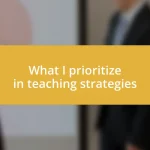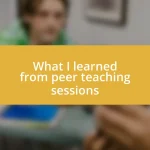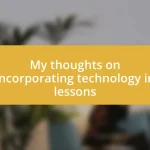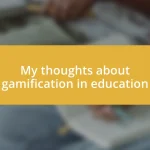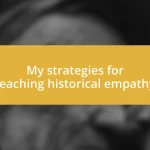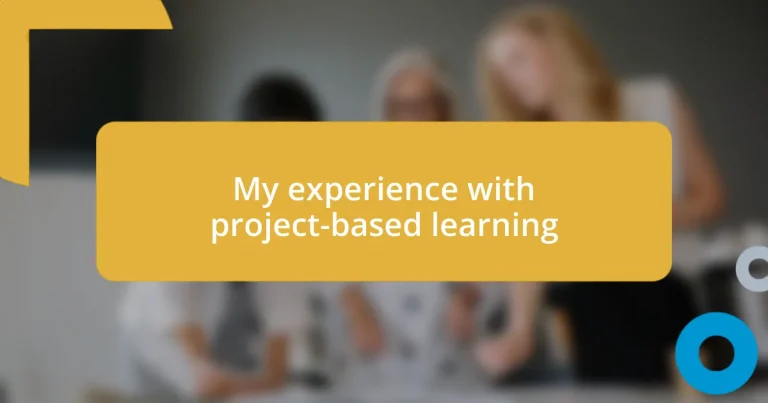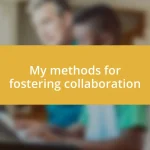Key takeaways:
- Project-based learning (PBL) fosters real-world application, critical thinking, and collaboration, enhancing understanding and passion for learning.
- Clear communication, realistic goal-setting, and flexibility are crucial strategies for successful project outcomes, helping teams navigate challenges effectively.
- Reflection on experiences and lessons learned promotes personal growth, empathy, and a continuous improvement mindset for future projects.
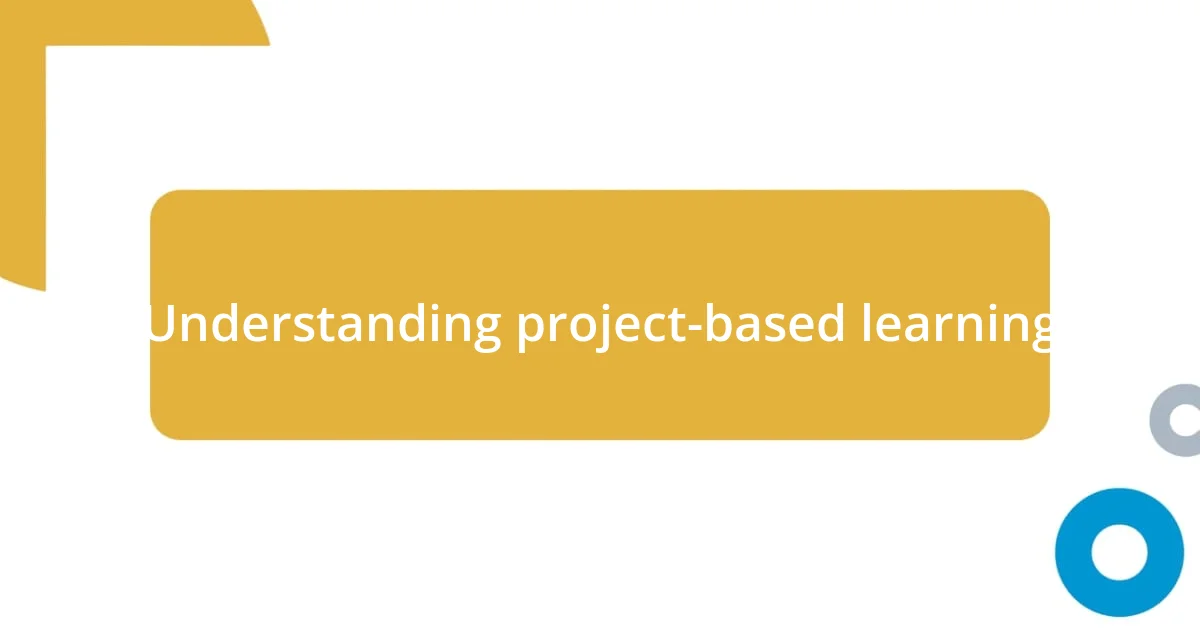
Understanding project-based learning
Project-based learning (PBL) revolutionizes the way we engage with education by centering learning around real-world problems and projects. I remember diving into a community service project during my studies, where we created a local awareness campaign. The excitement was palpable; we weren’t just learning theories, but actively applying what we learned to make a difference—what a powerful way to grasp complex concepts!
Through my experience, I’ve realized that PBL goes beyond traditional rote memorization. It fosters skills like critical thinking and collaboration, as we often worked in teams to achieve our goals. Have you ever felt the thrill of solving a problem with your peers? I found that those moments not only built friendships but also deepened my understanding of the subject matter.
In many ways, project-based learning acts as a catalyst for deeper understanding. I often reflect on how those projects ignited a genuine passion for learning within me—driving me to explore topics with curiosity rather than obligation. Isn’t it fascinating how engaging with hands-on projects can transform our educational experiences?
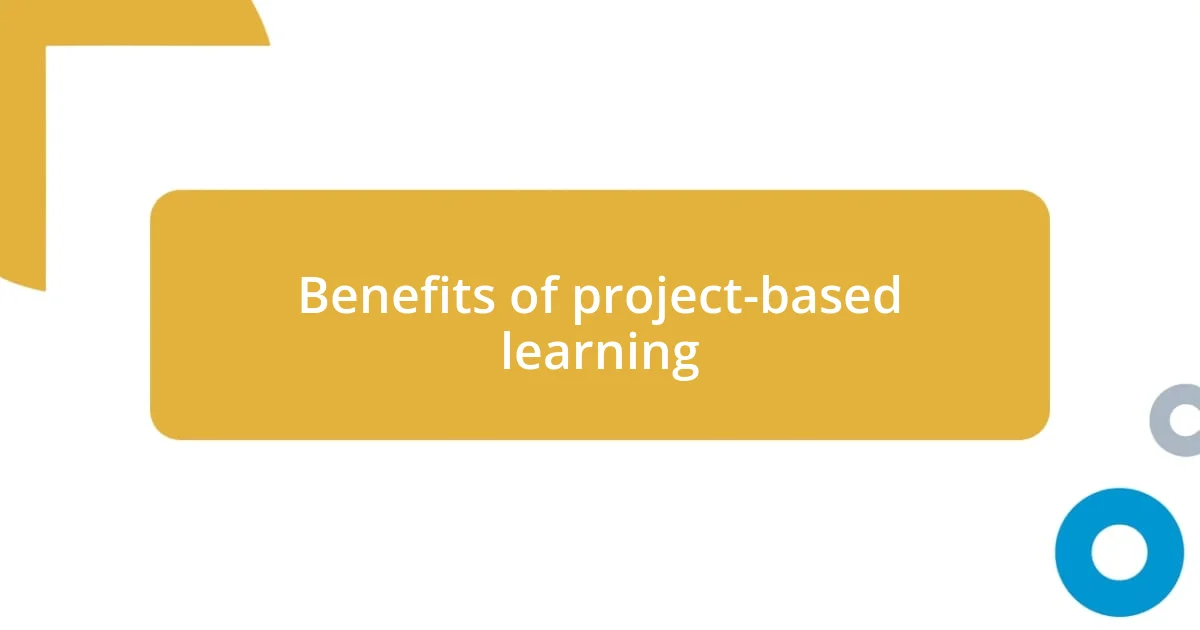
Benefits of project-based learning
Engaging with project-based learning opens up a world of benefits that traditional learning methods often overlook. One of the most rewarding aspects, in my experience, is the opportunity for real-world application. I recall a time when our group developed a mobile app to assist local businesses—it was thrilling to see our ideas come to life, and that sense of accomplishment was far more satisfying than any textbook exercise.
Moreover, PBL naturally cultivates a range of soft skills that are crucial in today’s job market. I distinctly remember the challenges of coordinating schedules and roles with team members. While it was sometimes frustrating, I learned the importance of communication and flexibility. These skills are invaluable—how often do we navigate similar challenges in our careers?
Finally, I’ve come to appreciate how project-based learning encourages a growth mindset. When faced with setbacks during our projects, the focus was always on learning from mistakes rather than feeling defeated. I remember the exhilaration of revising our proposal after receiving constructive feedback, which really drove home the idea that every failure is just a stepping stone toward success.
| Benefit | Description |
|---|---|
| Real-world application | Projects provide hands-on experiences that enhance understanding. |
| Development of soft skills | Collaboration and communication skills are naturally developed. |
| Encouragement of a growth mindset | Failures are seen as learning opportunities, fostering resilience. |
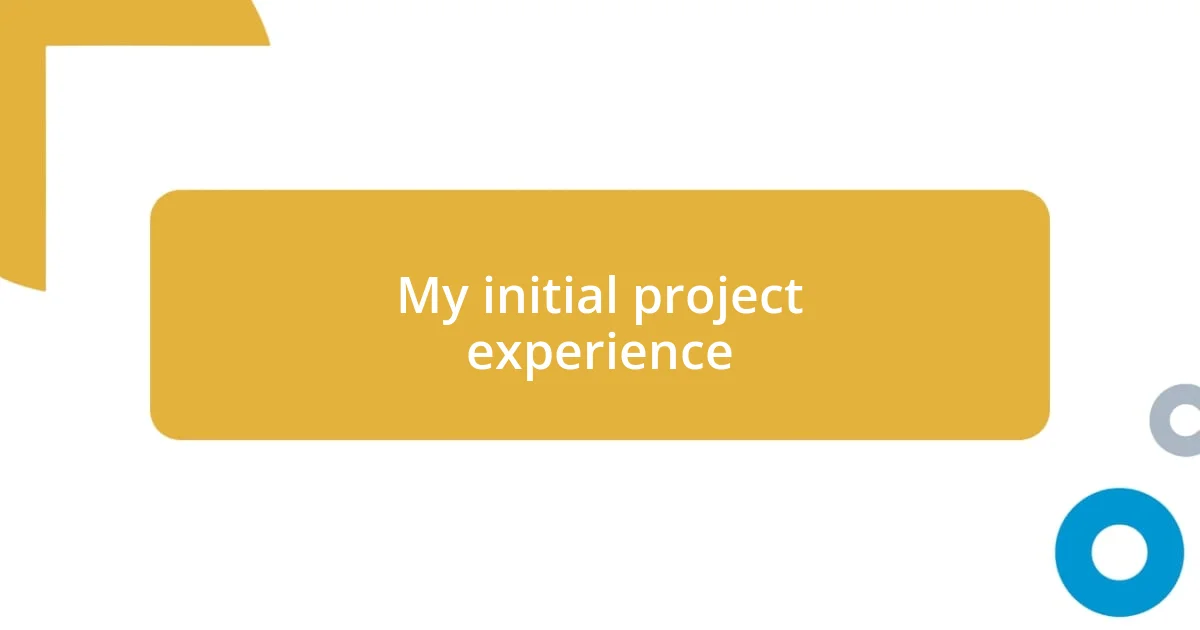
My initial project experience
One of my first experiences with project-based learning took place during a semester-long group project in high school focused on environmental sustainability. I remember how exhilarating it felt to brainstorm ideas with my teammates, each of us bringing different perspectives to the table. We decided to create a community garden, and the genuine excitement we all shared made the project incredibly fulfilling. Watching our idea blossom—not just in the garden, but in our own passion for the cause—was a moment I cherish.
- I enjoyed seeing how each person’s contribution mattered.
- The sense of ownership over our project enhanced my commitment.
- It reminded me of how collaboration can spark innovative solutions, transforming mundane tasks into something impactful.
- There was a palpable energy when we took our first steps in breaking ground— we weren’t just students; we were changemakers.
- The lessons learned went beyond gardening; they shaped my understanding of teamwork and responsibility in a community setting.
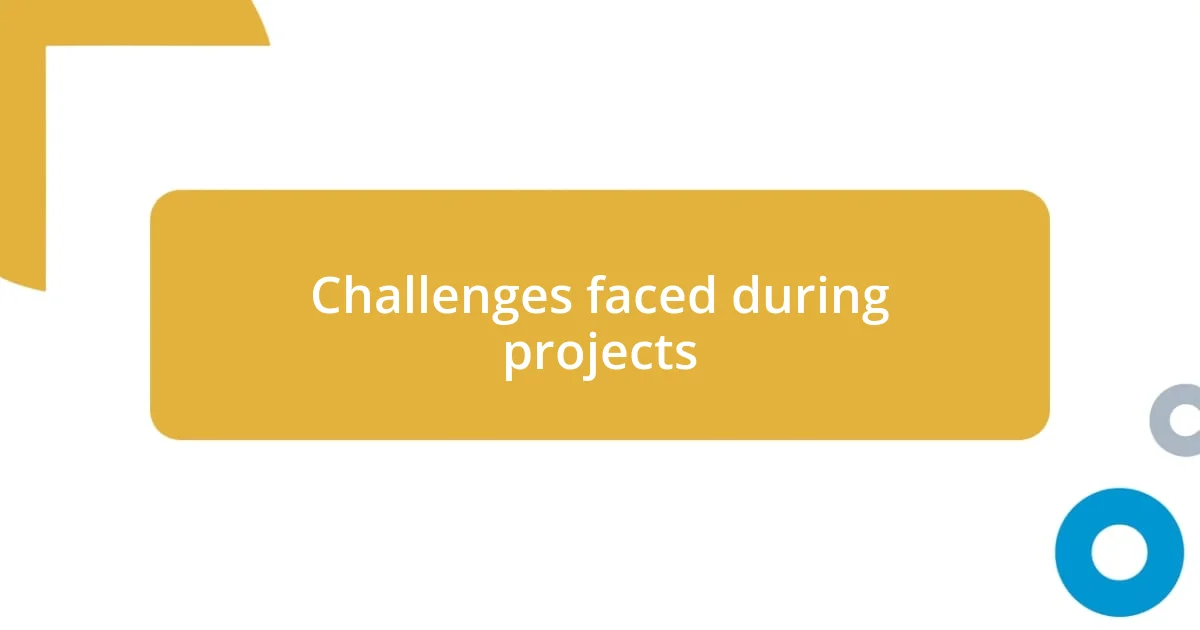
Challenges faced during projects
When diving into project-based learning, I encountered several hurdles that tested both my patience and problem-solving skills. For instance, our team’s initial enthusiasm quickly faded when we faced differing opinions on project direction. It was frustrating, but I realized that navigating such conflicts was part of the learning process. How often do we clash with others over a vision? It taught me that compromise and open dialogue are key to teamwork.
Then, there were the unexpected logistical challenges. I vividly remember the chaos of trying to gather materials for our community garden project; we miscalculated how much we needed. It pushed us to think outside the box—could we source donations or barter with local businesses? This experience highlighted the importance of resourcefulness, especially when things don’t go as planned.
Lastly, the time crunch was real. Deadlines loomed over our heads like dark clouds, making the pressure feel almost unbearable at times. I found myself working late into the night, trying to balance project demands with my other responsibilities. Yet somehow, pushing through those intense moments created a stronger bond with my teammates, leading us to celebrate our final product with greater joy. It made me ponder—do challenges inherently pave the path to triumph? In my case, they certainly did.
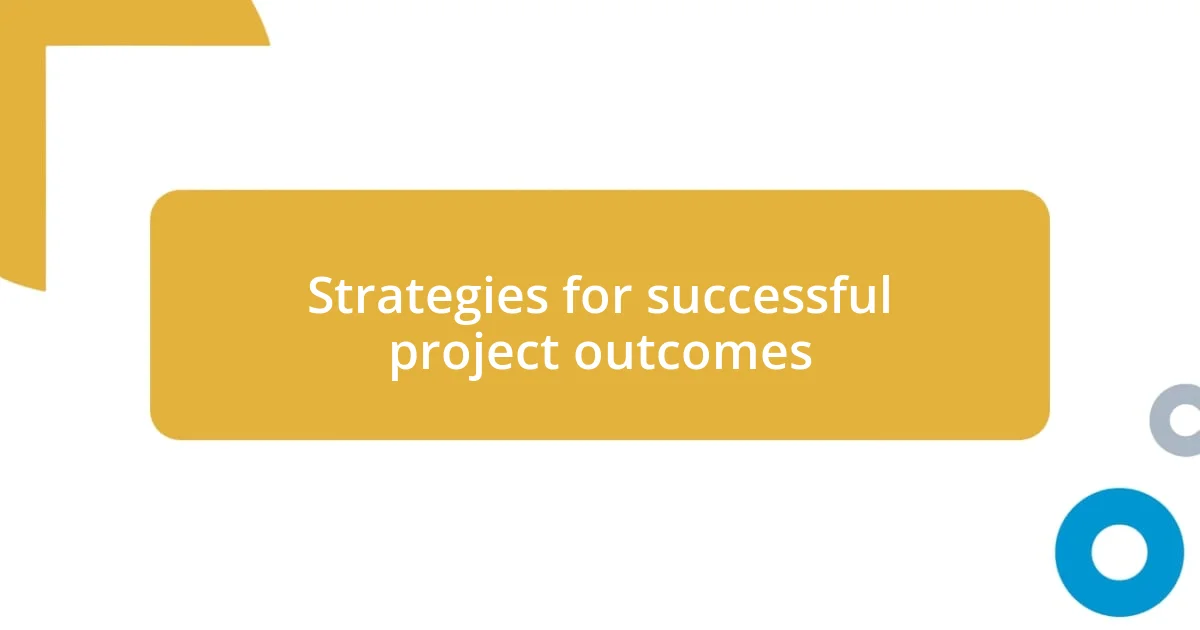
Strategies for successful project outcomes
Certainly! Here’s a section on ‘Strategies for successful project outcomes’ that fits your requirements:
When I reflect on what made our project successful, clear communication stands out as a non-negotiable strategy. Early on, I made it a point to establish regular check-ins with my teammates. This wasn’t just about updates; it created a space where everyone felt heard. I found that when we openly shared our progress and setbacks, it fostered trust and accountability within the group. How often do we underestimate the power of simply talking things out?
Another key strategy was setting realistic goals right from the start. I remember us breaking down our larger vision of the community garden into smaller, achievable milestones. Each small victory—from securing a plot of land to selecting the right seeds—kept our momentum going. It’s fascinating how celebrating these mini accomplishments can energize a team, isn’t it?
Lastly, embracing flexibility during our project proved invaluable. There were moments when our initial plans went haywire—like when unexpected weather threatened our planting schedule. Instead of stressing out, we adapted by researching alternative planting methods. This adaptability allowed us to learn, grow, and even innovate. In a way, it taught me the importance of resilience—after all, in life, isn’t it our ability to adjust that often defines our success?
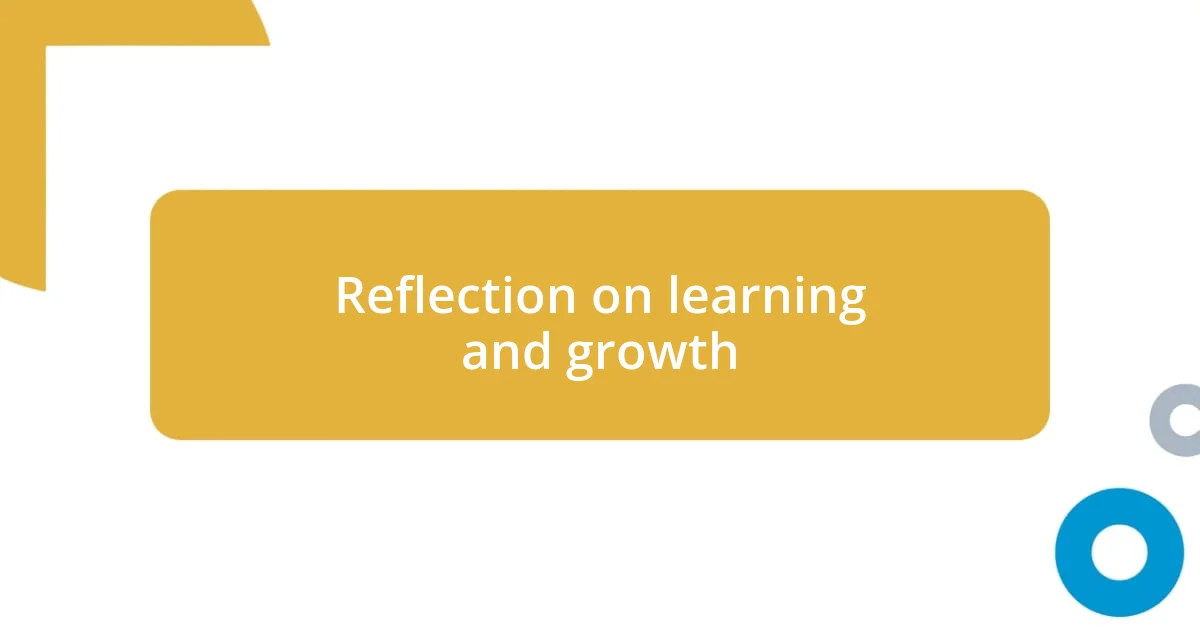
Reflection on learning and growth
Reflecting on my experiences with project-based learning, I’ve noticed that personal growth often stems from moments of vulnerability. I remember one particular instance during our community garden project when I had to present our findings to a group of community members. My nerves were palpable, and I questioned my abilities. However, as I spoke honestly about our journey—the challenges and triumphs—I felt a remarkable shift. Wasn’t it empowering to share both successes and missteps? In that moment, I realized that true learning occurs when we embrace our imperfect selves.
Another profound lesson emerged from the collaborative nature of our work. There were heated discussions where differing perspectives clashed, leaving a palpable tension in the air. I often wondered if we would find common ground. But through those disagreements, I uncovered the value of diverse viewpoints. It’s fascinating how such friction can forge stronger bonds and deepen understanding. With every challenge we navigated together, I felt my capacity for empathy grow. I learned that genuine collaboration isn’t just about blending ideas—it’s about recognizing the strengths in others and finding synergy.
Finally, I can’t overlook the importance of reflection itself. After completing each phase of our project, we carved out time for group reflection. I remember feeling lighter after sharing what I had learned and listening to others’ insights. This practice made me appreciate the iterative nature of learning and the growth that comes from looking back. Isn’t it amazing how reflecting on our experiences can illuminate not just what we did well, but also the areas we can improve? Each reflection session felt like adding another layer to my understanding, enriching my overall perspective on both the project and myself.
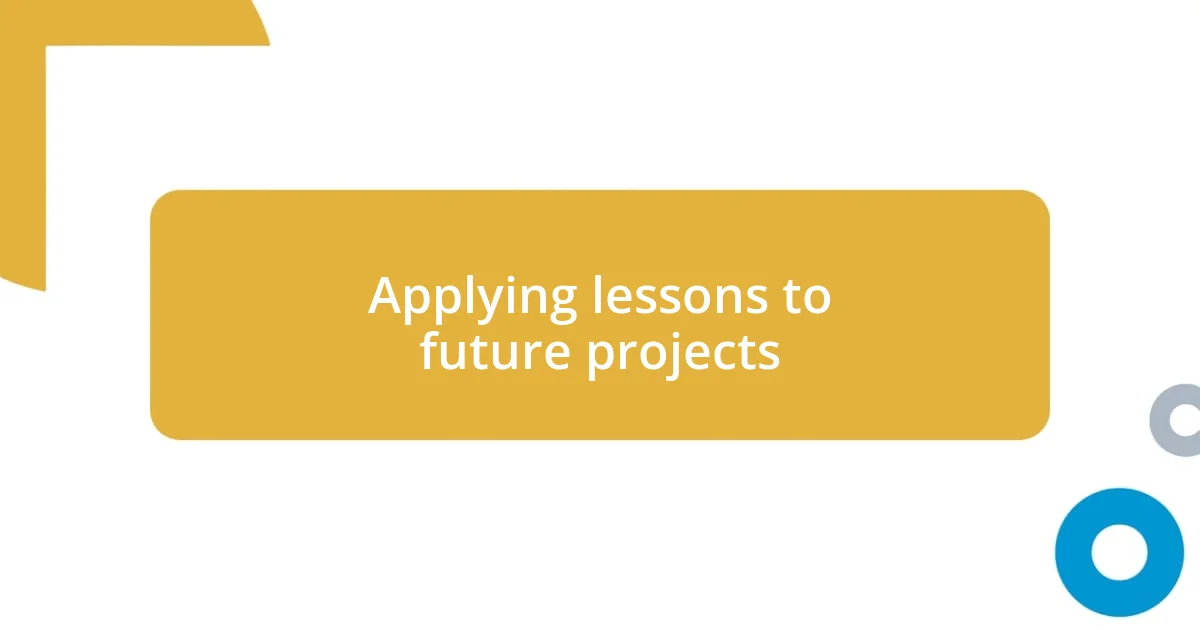
Applying lessons to future projects
Applying lessons from one project to the next is like building a toolkit that strengthens my approach. Whenever I tackle a new endeavor, I find myself recalling those memorable moments of triumph and trial from past projects. For example, I still vividly remember the thrill of adapting our community garden when faced with surprising weather challenges. Recognizing how adaptation not only saved our plants but also sparked new ideas reminds me to remain open-minded in future projects.
I’ve also learned the art of documenting my journey. After each project, I make a point to jot down insights and lessons learned—sometimes even over a cup of coffee on a quiet Sunday morning. Revisiting those notes stirs up feelings of nostalgia, but more importantly, it allows me to approach new projects with a clearer sense of direction and purpose. It’s amazing how writing things down transforms those fleeting thoughts into tangible guiding principles, isn’t it?
The aspect I truly cherish is the mindset of continuous improvement. For instance, reflecting on my early missteps in communication made me consciously prioritize clarity in every subsequent project. I remember the first time I mishandled a critical message—an oversight that led to confusion among my teammates. By embracing that initial mistake, I’ve learned to create structured communication channels, ensuring everyone is on the same page. It’s rewarding to witness how these small, intentional changes translate into more cohesive teamwork, igniting a common vision for future initiatives.


